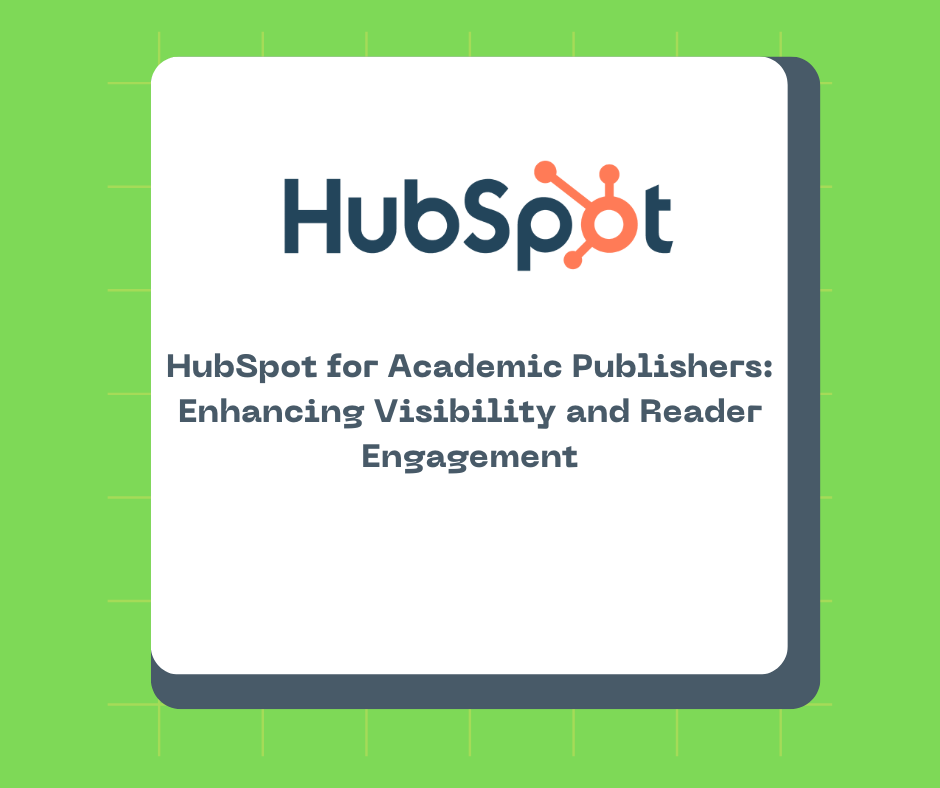In the evolving landscape of academic publishing, staying relevant and maintaining engagement with a scholarly audience can be a complex challenge. Academic publishers not only need to manage the dissemination of knowledge effectively but also ensure that their content reaches and engages the right audience. HubSpot, with its extensive suite of marketing tools, offers a unique solution for academic publishers looking to enhance their visibility and reader engagement. This article explores how HubSpot can be strategically utilized by academic publishers to optimize their marketing efforts.
Understanding the Academic Publishing Landscape
Academic publishing involves a meticulous process of vetting and disseminating scholarly work. Publishers play a critical role in enhancing the accessibility and visibility of academic research. The primary challenge lies in breaking through the information overload that academics face and positioning published content in a way that not only reaches its intended audience but also engages them effectively.
Key Challenges for Academic Publishers
- Targeted Distribution: Reaching a specific academic audience effectively.
- Reader Engagement: Encouraging active engagement and interaction with published content.
- Marketing Automation: Streamlining marketing efforts to save time and reduce operational costs.
- Data-Driven Insights: Utilizing analytics to guide marketing strategies and content development.
Leveraging HubSpot in Academic Publishing
HubSpot provides a robust platform equipped with CRM, email marketing, content management, social media tools, and analytics, all of which can be leveraged by academic publishers to meet their unique needs.
1. Streamlined Reader Management with HubSpot’s CRM
Effective management of reader relationships is key to maintaining and increasing engagement. HubSpot’s CRM system allows publishers to maintain a detailed database of their readers, including their interests, engagement history, and preferences.
- Strategy Example: Utilize the CRM to segment your audience based on academic interests, past downloads, and engagement with previous publications. This segmentation allows for tailored marketing campaigns that speak directly to the interests of different academic groups, enhancing relevance and engagement.
2. Personalized Email Marketing Campaigns
Email marketing remains a powerful tool for direct communication. HubSpot’s email marketing capabilities enable publishers to send personalized emails to segmented lists, improving open rates and interactions.
- Strategy Example: Develop targeted email campaigns to promote newly published papers or journals to relevant segments. Use personalization tokens to address recipients by name and reference their specific areas of interest, encouraging higher engagement rates.
3. Content Optimization and SEO
In the digital age, search engine optimization (SEO) is crucial for making academic content discoverable. HubSpot’s content management tools can help publishers optimize their content for search engines, increasing visibility and attracting more readers.
- Strategy Example: Use HubSpot’s SEO tools to identify key search terms used by your target academic audience. Optimize your website’s content, including article abstracts and journal descriptions, to rank higher in search engine results, making your content easier to find.
4. Enhancing Engagement Through Social Media
Social media platforms are increasingly used by academics to share and discuss research. HubSpot’s social media tools can help publishers manage their social media presence, schedule content, and engage with their audience effectively.
- Strategy Example: Schedule regular posts about recent publications, upcoming calls for papers, and behind-the-scenes content about the publishing process. Engage with users who comment on posts to foster a community and encourage further interaction with your content.
5. Automating Marketing Workflows
Marketing automation is a powerful feature in HubSpot that can save publishers time and effort by automating routine tasks.
- Strategy Example: Set up automated email workflows that trigger when users download a paper or sign up for journal updates. Follow-up emails could include related articles, invitations to webinars hosted by the authors, or requests for feedback on the publication.
6. Utilizing Analytics for Strategic Insights
Understanding what content performs best and how readers interact with your materials can inform future publication and marketing strategies. HubSpot’s analytics provide deep insights into content performance and reader behavior.
- Strategy Example: Regularly review analytics to understand which topics generate the most interest and engagement. Use these insights to guide calls for papers and to curate content that aligns with reader interests. Analyze traffic sources to refine your marketing strategies and focus efforts on the most effective channels.
Best Practices for Using HubSpot in Academic Publishing
- Integrate All Marketing Channels: Ensure that all your marketing efforts, from email to social media, are integrated within HubSpot for a cohesive strategy.
- Focus on Quality Content: Academic audiences value high-quality, informative content. Ensure that all content you produce meets a high standard of accuracy and relevance.
- Engage with Your Audience: Use HubSpot’s tools to regularly engage with your audience. Respond to emails, social media comments, and feedback to build a community around your content.
- Monitor and Adapt: Regularly use HubSpot’s analytics tools to monitor the effectiveness of your marketing strategies and be prepared to adapt based on what the data shows.
Conclusion
For academic publishers, HubSpot offers a comprehensive suite of tools that can transform how they engage with their readership. From managing complex databases of readers to automating marketing communications and enhancing content discoverability, HubSpot empowers publishers to increase the visibility of academic research and engage more effectively with the academic community. With strategic implementation, HubSpot can help academic publishers not only reach but actively engage their target audiences, fostering a more informed and connected academic world.
Schedule your training session here and comment “Need Training” on the request form.

Comments